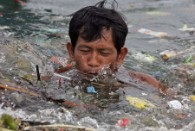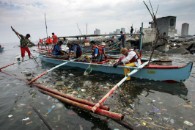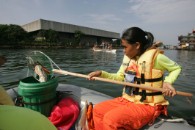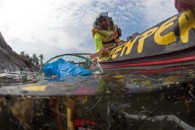To most of us Manila Bay, famous for its beautiful sunset.
Once upon a time, it was the site upon which the historical
Battle of Manila Bay in 1898 and the siege of Corregidor Island by
invading Japanese forces took place.
This bay was once considered one of the most beautiful in the
world, but
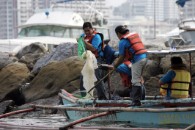 if you’d look at it now, the sludge, human
if you’d look at it now, the sludge, human
sewage, industrial waste and, especially, plain garbage that drifts
on its foul waters would give you a clear picture that it is one of
the most polluted.Much of the garbage is plastic from ‘single use’
sources – that is plastic bags, beverage bottles, cups and other
items intended to be used once and thrown away. Most of these
plastics come from land-based sources and are carried along deltas
of rivers and estuaries, smothering mangrove trees and other marine
life.
© Greenpeace / Gavin Newman
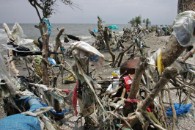 Upon the arrival of the Esperanza’s in
Upon the arrival of the Esperanza’s in
Manila to highlight the wonders and the environmental threats to
the world’s oceans, the ship’s crew and volunteers from Greenpeace
and the Eco-Waste Coalition this morning collected approximately
four cubic meters of plastic trash from Manila Bay onboard
inflatable boats, as part of a waste survey and documentation to
monitor the extent of plastic pollution in Manila’s famous
coastline. Manila Bay is considered one of the most polluted bays
in Asia, and plastics comprise most of the floating litter on its
surface.
Click here to know more about the waste survey.
Be an ocean defender!
Join us on our journey, and take action to Defend Our Oceans.


